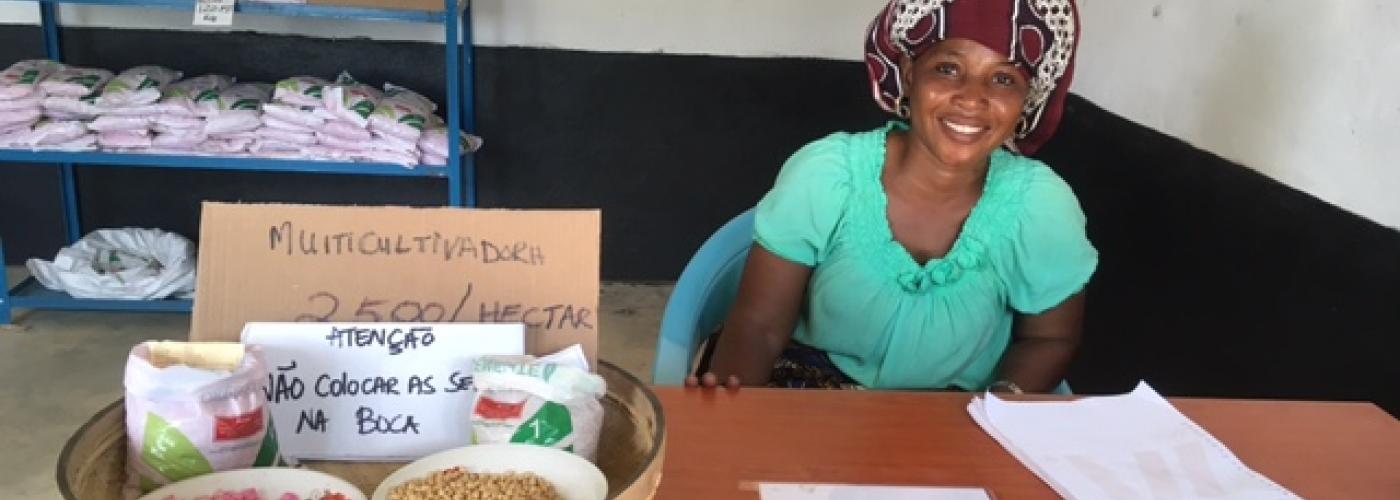Catalyzing Financing for Women-Owned Enterprises
Image

Women lead approximately one-third of small and medium-sized enterprises (SMEs) in emerging markets, but remain disproportionately underserved. They often face less favorable terms for financing and limited access to essential resources needed to build, sustain, and grow their businesses. In fact, more than 40 percent of women-owned SMEs surveyed in Africa cite access to finance as a major barrier to growth.[1]
In an effort to address this issue, USAID Administrator Mark Green launched the Accelerating Women Entrepreneurs Award (AWE) during the 2017 Global Entrepreneurship Summit to help women in Africa take their businesses to the next level. Feed the Future Partnering for Innovation implemented this award and worked closely with Open Capital Advisors, an Africa-based management consulting and financial advisory firm, to provide acceleration services such as investment readiness consulting, investor matchmaking support, and business analysis to the region’s most promising women-owned enterprises.
Partnering for Innovation and Open Capital Advisors recognize that both male and female entrepreneurs face significant challenges in accessing finance in emerging markets. We identified four best-practices in addressing the unique challenges faced by women-led businesses:
- Design and Deliver Targeted Support
Delivering support to women-owned enterprises that is specifically designed with their needs in mind leads to more effective engagement. For example, when providing acceleration services and support to women-owned enterprises, we need to acknowledge their potential time and travel constraints. By using digital communication tools such as WhatsApp or other technology platforms, we can ensure all women have access to services and support – even those who are living in rural areas and may be balancing demanding household and job responsibilities.
Targeted support needs to be provided directly to guarantors to encourage them to invest in women-owned enterprises by eliminating the perceived risks associated with entrepreneurs in emerging markets. We can reduce commercial sector risks, stimulate lending to underserved markets and sectors, and demonstrate the long-term commercial viability of this lending by helping guarantors better understand opportunities for investment and capture metrics for success.
- Establish Connections with Acceleration Providers and Investors to Support the Outreach Process
The female entrepreneurs we work with find that they are less connected to service providers and investor networks than their male counterparts. Without access to the knowledge these types of networks can provide, they are unsure of how to approach suitable service providers and investors, making it difficult to conduct targeted outreach that results in actual investment. Providing support from an intermediary to guide women-owned enterprises through this process creates connections and helps them overcome this barrier. This is especially true for investors with specific gender-investment requirements, as women-owned enterprises have a strategic advantage in accessing capital. Local organizations and service providers that build in-country capacity are excellent intermediaries, as they increase the opportunities for future engagement as well as the possibility for mentorship throughout the capital raising process.
- Facilitate Access to Capital
Accessing capital remains a challenge for women-led businesses across the globe. In Ghana and Nigeria, for example, stringent loan policies from local financial institutions often penalize female entrepreneurs, restricting access to essential early-stage capital. Improving access to capital for women-led businesses could include support for earlier stage businesses (when capital is most critical) by accessing guarantors for debt investment and working with financial service providers to promote female entrepreneurs.
Effectively supporting women-led businesses also requires an adjustment in approach from providers of capital to account for these factors. For example, financial institutions and investors can develop products and services that cater to women, rework the approval process for loans, and develop alternative systems that allow them to better track the performance of financial products that have been customized for women.[2] Additionally, we can train staff at financial institutions on how to best engage with female entrepreneurs and develop financial incentives for targeting female customers. This will encourage financial institutions to provide resources that are specifically suited for the unique barriers that women face.
- Help Fight Industry-Based Stereotypes
In many countries around the world, it is more socially acceptable for women to be entrepreneurs in nutrition or home-based industries. We can help women break into typically “male” industries (e.g. agtech) by leveraging convening power, the process of being part of a larger network of women-entrepreneurs and investors. We can also celebrate and tell stories about successful initiatives where women accessed the capital they needed to grow their business. By creating opportunities for women-led businesses to share international best practices and build their networks, we can show that female entrepreneurs are well-positioned to succeed in all business ventures.
Aligning the objectives of both private and public sectors proved to be a successful strategy, helping entrepreneurs such as the winners of the AWE Award gain greater access to financing and other business resources. By combining the expertise of Open Capital Advisors and Partnering for Innovation, we are increasing female entrepreneurs and business owners’ access to financing, market opportunities, and training to establish and grow their businesses. We are excited to continue promoting women as entrepreneurs, and leverage their ingenuity to create agricultural solutions that empower smallholder farmers, improve livelihoods, and boost economies and open markets.
Open Capital Advisors is a management consulting and financial advisory firm that drives growth, enables investment, and builds markets across Africa. Read more about Open Capital Advisors here. Feed the Future Partnering for Innovation is a program that partners with agribusinesses to help them sell new agricultural products and services to smallholder farmers. Read more about Partnering for Innovation here.

